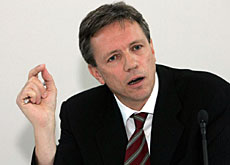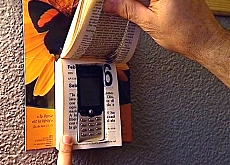Swiss telecom market stagnates

Growth in the Swiss telecommunications market is lower than that of the European Union and the Swiss are still paying higher mobile phone rates, say officials.
The Federal Communications Office also announced on Wednesday that all calls to the emergency services from mobile phones would soon be traced and the location pinpointed.
In its report into the Swiss telecoms market, the federal office found that growth in the domestic telecoms sector had increased by two per cent. This compared with a 4.3 per cent EU average.
Peter Fischer, the Communications Office’s deputy director, said the Swiss market was closer to saturation point than the European market.
The Swiss market was worth €7.7 billion (SFr11.9 billion) in 2004 and a two per cent rise is expected this year. In 2003, the Swiss market grew by 3.7 per cent.
In the area of mobile telephony, market penetration grew from 80.6 per cent to 86.7 per cent. The EU average stands at 83 per cent.
In terms of prices, the report found that the Swiss paid more than their European counterparts for local fixed-net calls. National fixed-net calls were found to be better value.
Mobile phone users were also having to dig deeper into their pockets, with telecoms giant Swisscom charging the most in Europe at the end of 2004. But Fischer added that new, lower price tariffs that had subsequently been introduced had not been taken into account.
Mobile phone emergency calls
In a separate move, the office also announced tracking for all emergency calls made from mobile phones.
Officials said the move would allow police, ambulance and fire services to respond more quickly and more efficiently to those in need.
It will initially be limited to pinpointing the radio cell from which the call comes, meaning that a call will be traced within a 50-metre zone in towns and cities and within a few kilometres in rural areas.
“In this way control rooms will able to locate a mobile phone caller in distress more easily,” said the federal office in a statement.
The new system will be adopted within the next year by GSM networks and over two years by UMTS.
Web-based telephony
The Communications Office said that from August 1 similar rules would be in place for web-based telephony, such as Voice over Internet Protocol (voIP), which it says is gaining ground in Switzerland.
For technical reasons it won’t be possible to localise calls made by internet straightaway, so service providers have been asked to tell their clients about the limits to the current system.
These include calls possibly being routed to the wrong control room or the wrong location being given.
swissinfo with agencies
Swiss telecoms market:
47% mobile communications
27% fixed net
17% fixed net data services
11% cable services
The Communications Office said that the move applied to web-based telephone services using Swiss telephone numbers and which allowed people to make and receive calls.
Other services, such as Skype, are not strictly internet telephony, it said. This is because they don’t use Swiss numbers and users can’t be called using conventional telephone numbers.

In compliance with the JTI standards
More: SWI swissinfo.ch certified by the Journalism Trust Initiative


You can find an overview of ongoing debates with our journalists here. Please join us!
If you want to start a conversation about a topic raised in this article or want to report factual errors, email us at english@swissinfo.ch.